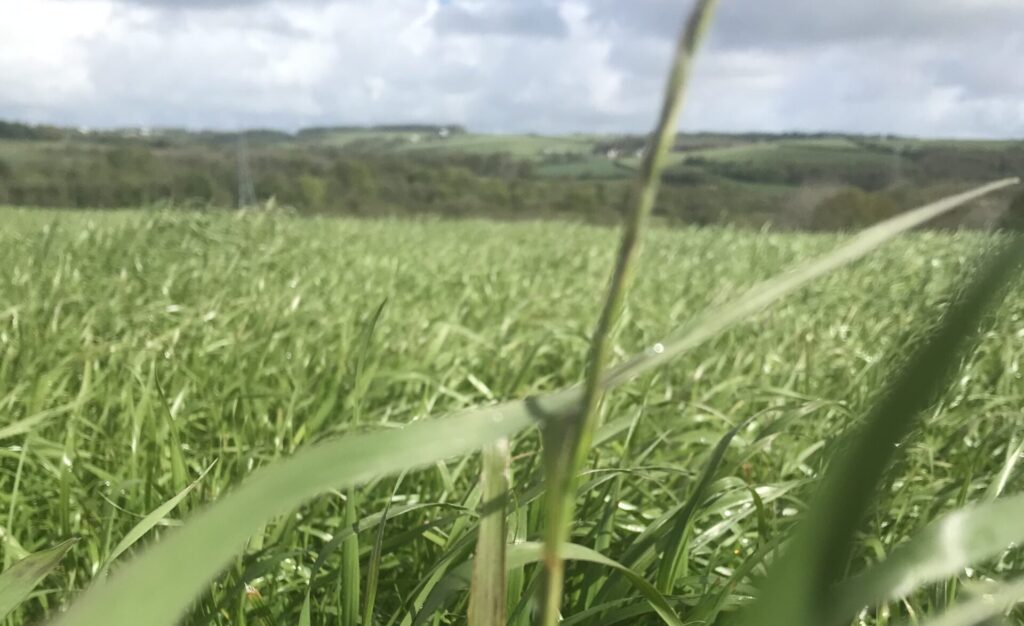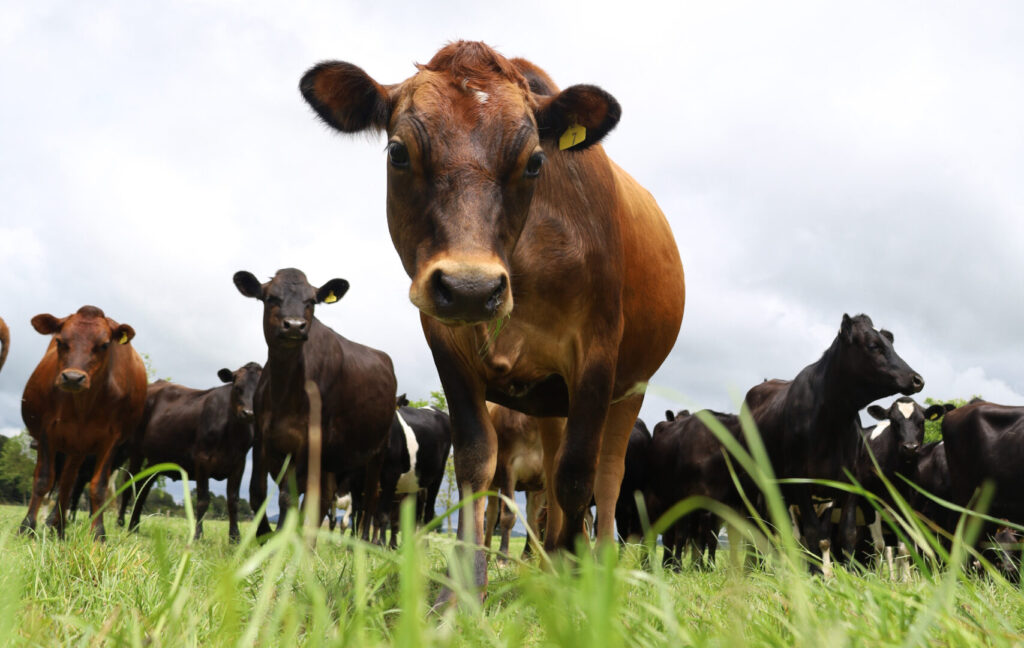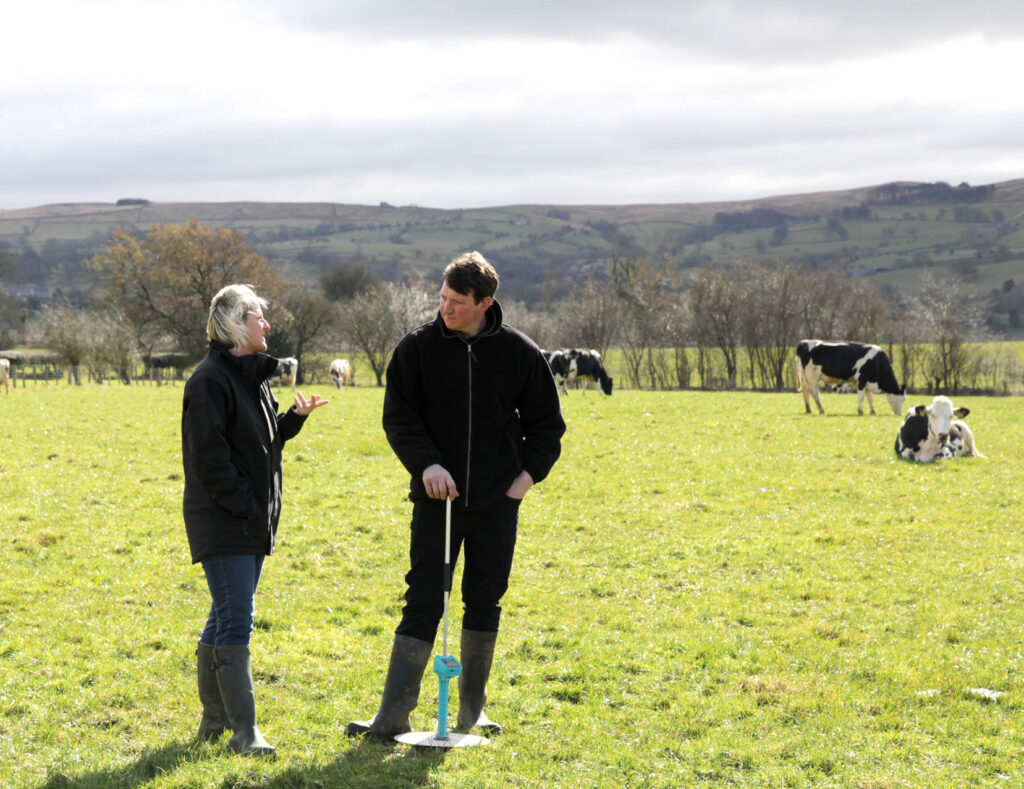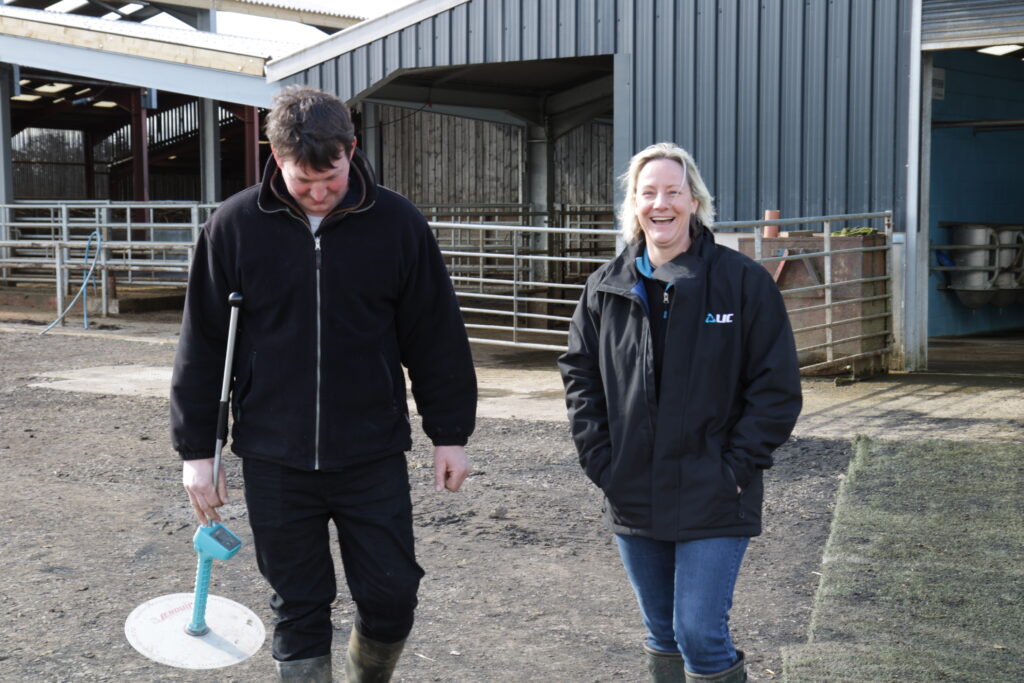The competition is open to all dairy farm types and scored on:
herd performance, including high herd health, welfare and fertility
profitability
staff management
environmental management
future sustainability.
One key factor behind Bisterne Farms’ Gold Cup success is the strength of the team. While the importance of teamwork is frequently discussed in the industry, few manage to fully achieve it. So we paid Bisterne Farms a visit to learn more about the farming operation and how they’ve made teamwork a cornerstone of their achievements.
The business operates under an Andersons Joint Venture Contract Farming Agreement, where both partners play crucial roles in its success. George provides the operational expertise, managing the staff, machinery, and coordinating contractors, while his partner, Hallam Mills, owns the fixed infrastructure, including 400 cows and 150 young stock. George contributes by owning any additional livestock beyond that. Together, they collaborate on the farm’s strategic direction, with George and his team executing the agreed-upon plans.
Farm Facts

Building a unified team
Although George comes from a non-farming background, having grown up in London and Essex and completing a non-agricultural degree at university, his passion for animals and the outdoors gradually led him to agriculture. His interest deepened while working on a university dissertation about first-generation farmers. A pivotal moment came when he met innovative dairy farmers Rhys Williams and Matthew Jackson from North Wales, inspiring him to pursue a career in dairy farming.
To gain hands-on experience, George spent two years in New Zealand before returning home, where he managed dairy farms for seven years. Throughout this time, he diligently saved money with the goal of eventually starting at Bisterne. His ultimate ambition is to purchase his own farm by the age of 40, which is now just seven years away. As a result, equity growth is a key factor in his long-term plans.
Hallam owns Bisterne Estate, which includes Bisterne Farms, arable land and woodland. After pursuing a career outside the estate, Hallam returned 25 years ago and t the same time the three dairies on the estate were consolidated into one. A strong advocate for conservation, Hallam has made it a central part of the estate’s ethos. While the dairy business remains the estate’s commercial foundation, it operates with a strong commitment to respecting and complementing the estate’s conservation efforts and other interests.
The driving force behind the farm’s success is a young, dynamic team of six full-time equivalents. George works alongside Jimmy, Adam, Oli, and Charlotte, with two students Rowan and Brandon, completing the team as the sixth full-time equivalent.
It was obvious just from the couple of hours we spent with the Bisterne team that they have a strong rapport and take great pride in their collective achievements. Everyone contributed equally, showing mutual respect and echoing each other’s sentiments.
What is remarkable about this group is the fresh perspective and enthusiasm they bring to the industry, since most of them are not from traditional dairy farming backgrounds.
Adam originally wanted to become a gamekeeper, buying and training a working spaniel at 14. After working as a butcher while owning 20 head of beef, he eventually realised he enjoyed the beef rearing more than the butchery, and joined Bisterne in June 2023.
Oli started beating on a local shoot whilst at school, where he met people involved in farming which led to a weekend job on a dairy farm. After a year in New Zealand learning as much as he could about dairy farming, he returned to the UK and started working with George. He joined George at Bisterne two years ago.
Charlotte attended Harper Adams University and George knew her brother, Freddy who contract farms in Wales. Charlotte saw her brother’s success so headed down under to Australia and worked on a dairy unit. On her return, she started working with George at Bisterne in October 2023.
Jimmy is local to Bisterne, where his dad owned a dairy farm. After attending Agriculture College, Jimmy travelled to New Zealand to milk cows full time to see if he enjoyed it. Upon his return, he worked with an all-year calving herd and gained experience in tractor and digger driving. In 2018, Jimmy returned to Bisterne full time with his wife.
Rowan and Brandon are at Sparsholt College and work part time at Bisterne.

How the team drives remarkable results
At Bisterne Farms, each team member brings unique skills to the table, but it’s their adaptability and mutual support that set them apart. Adam specializes in calf care from birth to 3 months, Oli oversees herd health, Charlotte manages grazing strategies, and Jimmy takes charge of machinery, maintenance, and training.
Despite their individual responsibilities, the team’s commitment to “mucking in where needed” ensures smooth operations across the farm. Their collaborative spirit is highlighted by Jimmy’s knack for onboarding new team members, fostering a cohesive and supportive work environment that strengthens the team dynamic.
Rowan and Brandon appreciate the supportive atmosphere and the opportunity to work with a team of dedicated professionals. This sense of respect and camaraderie is evident, even to outsiders—like the visiting veterinary student who observed the team’s cooperative nature, willingness to help, and freedom to explore new ideas.
The power of organisation and communication
When asked about the key drivers of their success, the team at Bisterne Farms pointed to strong organisation and clear communication. Regular Monday meetings are a cornerstone of their approach, providing a dedicated time to discuss weekly plans, assign tasks, and ensure everyone knows what needs to be done, when, and by whom.
Their commitment to effective planning is evident in their enthusiasm for using whiteboards to map out milking rotas and other essential tasks. The team’s ownership of these processes is unmistakable, with most of the discussion led by the team members themselves and minimal input from George, highlighting their autonomy and proactive approach.
They also use Google Sheets to keep operations organised. For example, the rota for next 4-5 months plus a comprehensive calendar highlighting key dates throughout the year. The team operates on 5.5-day workweeks with alternating weekends off, ensuring a balanced workload.
Among the many rotas, one stands out as a team favourite—the Wednesday cake rota. Each week, a different team member brings in a cake, which is then judged by the group, with homemade treats earning the highest praise and store-bought ones scoring notably lower.
Each team member is entrusted with a level of responsibility that encourages ownership and pride in their work. It’s clear that the team’s vibrant culture isn’t just coincidental—it’s carefully cultivated, guided, and allowed to grow naturally.
When discussing his team, George highlighted the importance of trust and delegation, acknowledging that managing 600 cows is too much for one person. His ability to delegate hinges on having an exceptionally good team, and his management approach, in turn, inspires people to collaborate effectively – a virtuous circle of teamwork. The Gold Cup win is the proof of the pudding!
The team at Bisterne Farms is notably young, with an average age of 23. George intentionally hires young people, training them with the expectation that they will eventually pursue other opportunities in their careers.
George adds “Dairy farming is quite measurable so instilling good practices to hit KPI’s gives a target and direction of travel. Any problems are dealt with by ‘what can we do differently’. People want to be heard so listening is a powerful strategy to solve any problems and move forward.”

Why Bisterne Farms entered the Gold Cup
When asked why he decided to enter Bisterne Farms for the Gold Cup, George said, “Mark Hoskins, a fellow discussion group member who entered a few years ago, and I found this very inspiring. Added to this, it gave us a greater reason to concentrate on technical detail. Also, we are doing some good stuff, so it is valuable to talk about these things in the wider industry, for example at Open Farm Sunday which we host.”
Behind the scenes: the Gold Cup judging for Bisterne Farms
For the Gold Cup judging, George and Hallam delivered a presentation detailing the background of the Estate and their joint venture. Following the presentation, they divided into two teams—Hallam, Oli, and Charlotte in one, and George, Adam, and Jimmy in the other—each accompanied by two judges. The teams then toured the farm, evaluating every aspect of the business—both both its strengths and areas for improvement.
This approach aimed to highlight the individual contributions of each team member and showcase their expertise in their respective roles. The team’s comfort with public speaking was evident, as they regularly engage in discussion groups and host visitors during events like Open Farm Sunday.
During the farm tour, each team member took the lead on various aspects, providing the judges with a comprehensive overview of key areas such as self-feed, the parlour, and the farm buildings. The tour also included a brief look at the grazing platform—though, being December, there was little activity to see. The teams then regrouped at the young stock area for further discussions.
George expressed some concerns about presenting the 600-cow herd, as they had housing for only 400 during the wettest winter since records began in 1960. However, this challenging scenario allowed the judges to witness the resilience of the farm’s systems under pressure.
During the Gold Cup judging, discussions often centered around management practices and business decisions at Bisterne Farms. Oli emphasised the importance of mastering the basics and highlighted how George’s well-informed management decisions are strongly backed by the entire team.
One key conversation arose when judges questioned why the farm hasn’t adopted certain technologies, like collars. Oli explained that while such technology might suit some operations, Bisterne Farms values investing in people. Using technology could save on labor costs, but it would also mean one less young person gaining valuable experience and training in the industry—a loss that could ultimately weaken the future of dairy farming by reducing the number of skilled workers entering the field.
What’s ahead for Bisterne Farms
The team expressed their excitement about being recognised for the farm’s success and the significant changes they’ve navigated in recent years. Transitioning from an all spring-calving system to a split block system, they have effectively leveraged the opportunities provided by the Estate to optimise their operations.
This recognition validates the dedication and hard work put in by the entire team, highlighting their adaptability and commitment to continuous improvement.
George shared that Hallam is thrilled with the recognition the Estate has received, highlighting its success in showcasing an effective Joint Venture model within a successful dairy enterprise. Looking ahead, the immediate plans include constructing a new slurry store and covering the existing one, followed by a period of consolidation and fine-tuning to ensure long-term success. As George aptly put it, “We need to be boring for a bit.”
Bisterne Farms’ Gold Cup victory stands as a powerful testament to the impact of effective teamwork in agriculture. As Piers summed it up perfectly,“Team from beginning to end!”



